- Home
- Elmore Leonard
Hombre Page 4
Hombre Read online
Page 4
But maybe he even thought he really was Apache. That had never occurred to me before. It would have been something to look into his mind. Not for long. Not for more than a few minutes; just time enough to look around with his eyes, around and back at things that had happened to him. That would tell you a few things.
I started to think of the stories Henry Mendez had told about Russell, piecing little bits of it together now.
How he had been Juan something living in a Mexican pueblo before the Apaches came raiding and took some of the women and children. How he had been named Ish-kay-nay and brought up by these Chiricahuas and made the son of Sonsichay, one of the sub-chiefs of the band. Five years with them and he must have learned an awful lot.
Then, after that, living in Contention with Mr. James Russell until he was about sixteen. He had gone to school there. And he had almost killed a boy in a fight. Maybe there was a good reason he did it. But he had left soon after, so maybe there wasn’t a good reason; maybe he just couldn’t be taught anything.
Then the most interesting part. How John Russell got his next name, Tres Hombres.
He had been with the mule packers on that campaign of the Third Cavalry’s, chasing down into Mexico after the bands of Chato and Chihuahua, and he got his new name in a meadow high in the Sierra Madre, two days west of the village of Tesorababi.
He had gone out looking for these mule packers who had wandered off the trail, hunting them all day and finding them, three mozos and eighteen mules, an hour before dark and a moment before the sudden gunfire came out of the canyon walls and caught them and ended four of the mules.
John Russell, who was sometimes Juan or Juanito, but more often Ish-kay-nay to the older ones of the Apache Police, shot six more of the mules in the moments that followed and he and the mozos laid behind the dead mules all night and all the next day. The Apaches, nine or ten of them, came twice. Running and screaming the first time they left two dead before they could creep back out of range of John Russell’s Spencer. That was the evening of the first day. They came again at dawn, silently through the rocks with their bodies mud-streaked and branches of mesquite in their head-bands. They said that John Russell, with the Spencer steadied on the neck of a dead mule, waited until he was sure. He fired seven times with the Spencer, taking his time as they came at him, and emptied his Colt revolver at them as they ran. Maybe two more were hit.
The packers, their eyes closed and their bodies tight against the mules while the firing was going on, smiled at John Russell and laughed with relief at their fear when it was over. And, when they returned to the main column, they told how this one had fought like three men against ten times as many of the barbarians. From then on, among the Apache Police at San Carlos, the trackers at Fort Apache and Cibucu, John Russell was known as Tres Hombres.
But knowing all this wasn’t the same as seeing things through his eyes. Maybe his past relations with white people explained why he acted the way he did, why he didn’t speak up now, but I’m not sure. Maybe you can see it.
It was colder later on, so I got the two robes from the floor and handed one of them to Dr. Favor. He took it and his wife spread it out so it would cover Frank Braden too. I unfolded the other robe for our seat. There was the soft clicking sound of the McLaren girl’s beads as she raised her hands. She gathered the end of the robe close to her, wedging it against her leg and not offering any of it to John Russell. I even had the feeling she had moved closer to me, but I wasn’t sure.
I heard Dr. Favor say something to his wife; the sound not the words. She told him not to be silly. I asked the McLaren girl if she was comfortable. She said, yes, thank you. Mostly though, no one spoke. It was a lot colder and the canvas curtains, that were all the way down now, would be flat one minute, then snap and billow out with the wind and through the opening you could see the darkness and shapes now and then going by alongside the road.
Frank Braden had eased lower in the seat and his head was very close to Mrs. Favor’s. He said something to her, a low murmur. She laughed, not out loud, almost to herself, but you could hear it. Her head moved to his and she said one word or maybe a couple. Their faces were close together for a long time, maybe even touching, and yet her husband was right there. Figure that one out.
We came in to Delgado’s Station with the slowing, braking sound of the coach coming off the slope that stretched out toward a wall of trees and the adobes that showed faintly against the trees. The coach kept rolling slower and slower and slower, with the sound of the horses getting clear and heavy, and finally we stopped. We sat there in silence and when Mrs. Favor said, “Where are we?” in just a whisper, it sounded loud inside that coach in the darkness. No one answered until we heard Henry Mendez outside.
“Delgado!” he yelled.
Then close on it came the sound of his steps and the door opened. “Delgado’s Station,” Mendez said. He stood there holding his leather bag. Beyond him, a man was coming out of the adobe carrying a lantern.
“Mendez?” The man raised the lantern.
“Who else?” Mendez said. “You still got horses?”
“For a few more days,” Delgado, the station-master, answered.
“Change them for these.”
“You got a stage?”
“A long story,” Mendez said. “Get your woman to make coffee.”
Delgado was frowning. He wore pants with striped suspenders over his underwear. “How do I know you’re coming?”
“Just move your people,” Mendez said. He turned to the coach again. “You wash at the bench by the door. You follow the path around back for other things.” He offered his hand and Mrs. Favor got out. Then the McLaren girl.
“Twice in one night,” Delgado said. “An hour ago we are in bed and three men come by.”
“You should have stayed up,” Mendez said.
Mr. Favor was just getting out of the coach. “Did you know them?” he asked.
“Some riders.”
“But did you know them?”
Delgado looked thoughtful. “I don’t know. I think they work for Mr. Wolgast.”
“Is that usual,” Dr. Favor said, “them coming by this time of night?”
“Man, it happens,” Delgado said. “People go by here.”
By the time I went around back and came out again, just Mendez and Russell were standing there. Mendez took a bottle that looked like brandy out of his leather bag and both of them had a long drink.
Two boys, in shirts and pants but barefooted, came out of the adobe. Both of them smiled at Mendez and one of them called, “Hey, Tio, what have you got?”
“Something for your grease pails,” Mendez said, “and the need of clean horses.” The boys ran off again, around the adobe, and Mendez turned to John Russell again.
“How do you like a mud wagon?”
Russell said something in Spanish.
“How do you like it in English?” Mendez said.
“That again,” Russell said.
“Practice, uh? Then you get good.”
“Maybe if I don’t speak it’s better.”
“And what does that mean?” Mendez asked.
Russell didn’t say anything. One of the boys came running out again with a bucket and Mendez said, “Paint them good, chico.”
“This costs more at night,” the boy said, still smiling, as if still smiling from before.
“I’ll pay you with something,” Mendez said. He took a swipe at the boy with the leather bag, but the boy got past him. Then he offered the brandy to Russell again. “For the dust,” he said. “Or whatever reason you want.”
While Russell was taking a drink, Mendez saw me and offered me one, so I joined them and had a swallow. It was all right, except it was so hot. I don’t know how they took the big swigs they did. Mendez took his turn then handed the bottle to Russell and went into the adobe.
The Mexican boy with the grease pail was working on the front wheels now. The other boy had unhitched the lead team and was ta
king the horses off. We watched them a while. Then I said, “How come you didn’t tell them?”
He looked at me, holding the bottle. “Tell them what?”
“That you’re not what they think.”
His eyes looked at me another second. Then he took a drink of the brandy.
“You want to go in?” I said. He just shrugged.
We went in then—into a low-ceilinged room that was lighted by one lantern hanging from a beam; the lantern had smoked and there was still the oil smell of it in the room.
The Favors and the McLaren girl and Braden were sitting at the main table, a long plank one in the middle of the room. Mendez stood there like he had been talking to them. But he moved away as we came in and motioned us over to a table by the kitchen door. Delgado’s wife came out with a pot of coffee, but went over to the main table before pouring us some. Mendez waited, looking at Russell all the while, until she went out to the kitchen again.
“They think you’re Apache,” he said.
Russell didn’t say anything. He was looking at the brandy bottle as if reading the small print. Mendez picked up the brandy and poured some of it in his coffee.
“You hear what I said?”
“Does it make a difference?” Russell said then.
“Dr. Favor says you shouldn’t ride in the coach,” Mendez said. “That’s the difference.”
Russell’s eyes raised to Mendez. “They all say that?”
“Listen, you wanted to ride with me before.”
“Do they all say I shouldn’t be in the coach?”
Mendez nodded. “Dr. Favor said they agreed to it. I said this boy isn’t Apache, did you ask if he was? Did you ask him anything? But this Favor says he isn’t going to argue about it.”
Russell kept looking at Mendez. “What did you say?”
“Well—I don’t know,” Mendez said. “Why have people unhappy? Why not just”—he shrugged—“let them have their way? It isn’t a big thing. I mean I don’t know if it’s something worth making trouble about. He’s got this in his mind now and we don’t have time to convince him of the truth. So why should we let it worry us, uh?”
“What if I want to ride in the coach?” Russell said.
“Listen, you wanted to ride with me before. Why all of a sudden you like it inside now?”
It was the first time I ever saw Mendez look worried, like something was happening that he couldn’t handle or have an answer for. He drank some of his coffee, but looked up quickly, holding the cup, as Braden and Dr. Favor rose from the table. Braden went outside. Dr. Favor went over to the bar where Delgado was, and Mendez seemed to relax a little and sip his coffee.
“Is it worth arguing about?” Mendez said. “Getting people upset and angry? Sure, they’re wrong. But is it easier to convince them of it or just forget about it? You understand that?”
“I’m learning,” Russell said.
Right there, again, I’d like to have seen what was going on in his mind, because you certainly couldn’t tell from his tone. He had such a quiet way of speaking you got the feeling nothing in the world would ever bother him.
While we were still sitting there, Dr. Favor motioned Mendez over to the bar where he and Delgado were. Mendez stood there talking to them for a long time, while we finished our coffee and had another. Finally Mendez came back. He didn’t sit down but took a drink of the brandy.
“Dr. Favor wants to go another way,” Mendez said. “The road down past the old San Pete Mine.”
It was a road Hatch & Hodges had used years before when the mine was still in operation. It ran fifteen or so miles east of the main road, through foothills and on up into high country past the mine, then it joined the present main road again on the way to Benson. But I had never heard of anyone taking it these days. The country through there was wild and climbing, harder to travel over. That’s why the new road had been put through after the mine shut down. The only thing you could say about the old road was it was shorter.
But was that reason to take it?
Mendez said why not? Delgado was sure the rest of the stations along the main road had already shut down. At least all their change horses had been moved south by now. Delgado was the only one left with any and his would be gone in a few days. If we have only six horses and there are no more stations, Mendez said. Why not go the short way?
That made sense. We’d have to bring extra food and water, though. Mendez agreed to that. He said as long as Dr. Favor was paying for most of this, why not keep him happy? (Henry Mendez seemed very anxious to keep people happy.)
“Maybe he’s a little worried too,” Mendez said. “He was talking to Delgado again about those people who came by here. What did they look like? Did they say where they were going? Things like that.”
“If he thinks they plan to hold us up,” I said, “they couldn’t. They wouldn’t know a stage was coming by here tonight.”
“I told him that,” Mendez said. “He said, ‘If there is a possibility of being stopped, we should take precautions.’ I said, ‘Maybe, but, if this was the regular stage, we wouldn’t even be talking about it.’ ”
“Maybe he is really worried,” I said.
Mendez nodded. “Like something’s after him. And he knows it.”
A little later, after Mendez had seen about the provisions and water bags, we got moving again. Frank Braden was already in the coach asleep with his feet on the seat across from him. We just let him be. There was room enough with John Russell up on the boot now.
Soon we were alone in the night with the rumbling and creaking sounds. We turned off the road about two miles south of Delgado’s and went through a mesquite thicket with the branches scraping both sides of the coach. Then this trail opened up and you could feel it beginning to climb. We would move through trees, in and out of close darkness, all the time following the winding, climbing road that led on and on, two rutted tracks that were overgrown but I guess still visible to Mendez.
About three hours out of Delgado’s, Mendez and Russell changed the teams, giving the two spares a turn in the harness, and watering them. I was the only one who got out of the coach, though I’m sure Dr. Favor was awake too. I had a drink of water from Mendez’s canteen (this was kept in the driver’s boot; three hide bags of water on the back end were for the passengers and the horses) and then we were off again.
I went to sleep after that, wondering for the longest time if the McLaren girl would say anything if I was to put my arm around her. I never did find out.
With the first signs of daylight and down out of a winding, steep-sided canyon, we came to the abandoned San Pete mine. Mendez and Russell were standing there as we got out, everybody stretching, feeling the stiffness from being cramped up so long, and looking around at the company buildings.
The ones near us were built against the slope so that the front verandas were on stilts and high as a second floor. Out across the canyon the mine works were about two hundred yards off: the crushing mill part way up the slope, the ore tailings that humped in hogbacks down from the mine shaft way up higher. Braden was looking at Mendez. “This isn’t the stage road,” he said.
“We took a different way,” Mendez answered. He was at the back untying one of the waterskins.
“What do you mean a different way?”
I noticed John Russell step away from the horses. He watched Braden move toward Mendez who was lifting the waterskin to his shoulder.
“You take any road you feel like?”
“Talk to Dr. Favor,” Mendez said.
“I’m talking to you.”
Mendez had started for the building, but he stopped. “The others agreed on it,” he said. “You were asleep. But I thought, if he wants to come with us so bad then this is all right with him.”
Braden kept watching him. “Where does it lead?”
“Same places,” Mendez answered. He took the waterskin under the veranda and came out again stretching, looking up at the sky that was still dull though stre
aked with traces of sunlight above the far end of the canyon. “We eat now,” Mendez said. “Then rest for two hours.”
Dr. Favor said, “If you’re thinking of us—”
“More of the horses,” Mendez said. “And me.”
We ate breakfast under the veranda of the main company building, some of the bread and cold meat and coffee Mendez had brought. And after Mendez took his blanket roll to the next house, the only one besides the main one that still had a roof. John Russell went with him and they slept for a couple of hours.
So there was nothing to do but wait during that time. The mud wagon stood alone with the horses grazing farther down the canyon where there was grass and some owl clover. After a while Frank Braden walked out past the coach, gazing at the slope above the mine works, then looking up-canyon, the way he had come. He went on getting smaller and smaller as he crossed the canyon and got up by the crushing mill. He kept going, finally reaching what looked like an assay shack high up by the mine shaft and you couldn’t see him any more. I wondered if he was waiting for Mrs. Favor to come up. That or he was just restless.
Whichever, Braden was back in plenty of time. He had calmed down and he asked Mendez how long it would take to reach Benson. Mendez told him this way was shorter than the stage road, but we had the horses to consider. So maybe it would take just as long, arriving in Benson sometime tomorrow morning if the road was all right and if nothing happened.
Well, we left the San Pete mine before eight o’clock and by midnight the first if came true.
The trouble was not in following the road, a matter of whether or not the road was “all right.” There was just no road to follow. We crossed a shallow arroyo that came down out of the high rocks, and on the other side, where the road should have continued, there was no trace of it.
Wind and rock slides and flash floods had worn the road away or covered it or wiped it clean from the slope. Mendez had no choice. He took the coach down the arroyo, bucking, fighting down through the yellow palo verdes that grew along the banks waiting for water, then south again, out into the flat brush country to circle the dry washes and rock formations that extended out from the slopes.

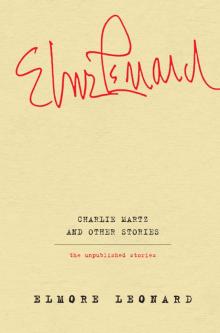 Charlie Martz and Other Stories: The Unpublished Stories
Charlie Martz and Other Stories: The Unpublished Stories Elmore Leonard's Western Roundup #2
Elmore Leonard's Western Roundup #2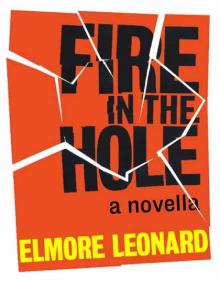 Fire in the Hole
Fire in the Hole Tishomingo Blues (2002)
Tishomingo Blues (2002)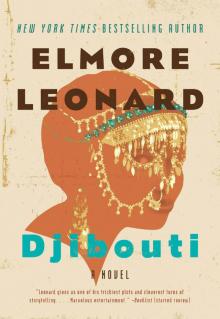 Djibouti
Djibouti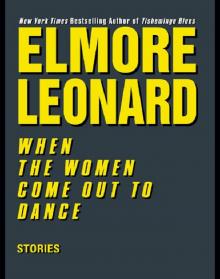 When the Women Come Out to Dance: Stories
When the Women Come Out to Dance: Stories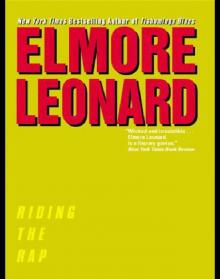 Riding the Rap
Riding the Rap Moment of Vengeance and Other Stories
Moment of Vengeance and Other Stories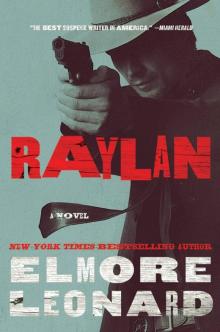 Raylan
Raylan Touch
Touch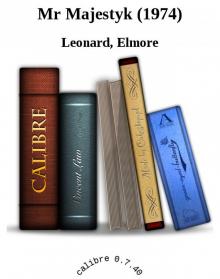 Mr Majestyk
Mr Majestyk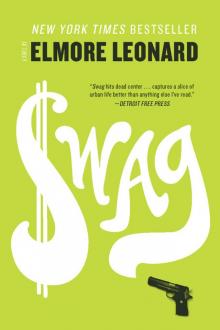 Swag
Swag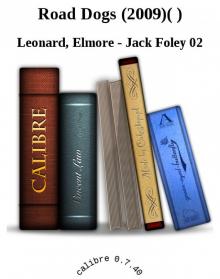 Road Dogs
Road Dogs La Brava
La Brava The Hot Kid
The Hot Kid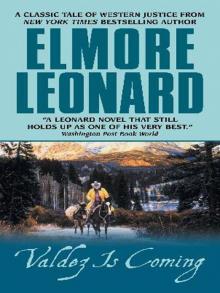 Valdez Is Coming: A Novel
Valdez Is Coming: A Novel Be Cool
Be Cool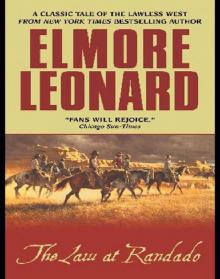 The Law at Randado
The Law at Randado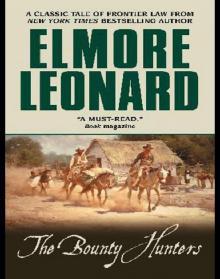 The Bounty Hunters
The Bounty Hunters When the Women Come Out to Dance
When the Women Come Out to Dance 310 to Yuma and Other Stories (1953)
310 to Yuma and Other Stories (1953)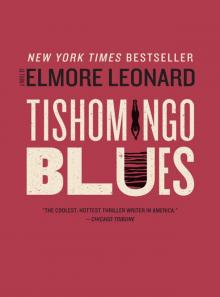 Tishomingo Blues
Tishomingo Blues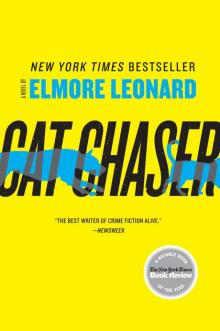 Cat Chaser
Cat Chaser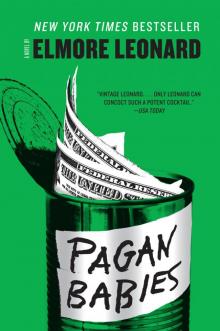 Pagan Babies
Pagan Babies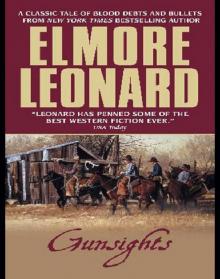 Elmore Leonard's Western Roundup #1
Elmore Leonard's Western Roundup #1 52 Pickup
52 Pickup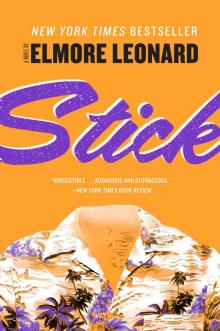 Stick
Stick The Moonshine War
The Moonshine War Valdez Is Coming
Valdez Is Coming City Primeval
City Primeval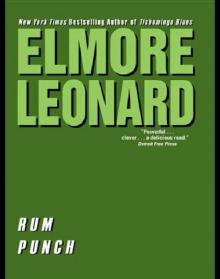 Rum Punch
Rum Punch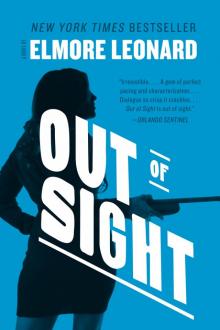 Out of Sight
Out of Sight Naked Came the Manatee (1996)
Naked Came the Manatee (1996)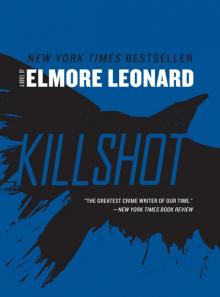 Killshot
Killshot Cuba Libre
Cuba Libre Forty Lashes Less One
Forty Lashes Less One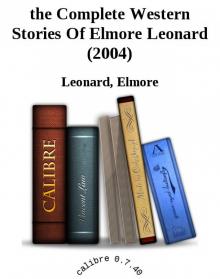 The Complete Western Stories of Elmore Leonard
The Complete Western Stories of Elmore Leonard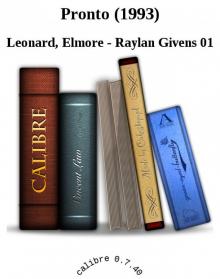 Pronto
Pronto Split Images
Split Images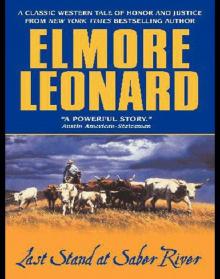 Last Stand at Saber River
Last Stand at Saber River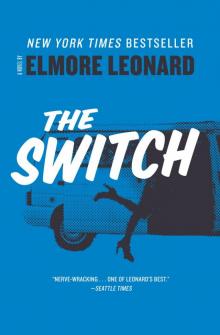 The Switch
The Switch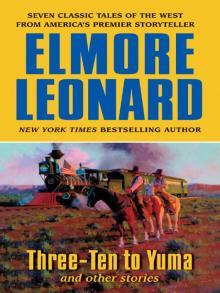 Three-Ten to Yuma and Other Stories
Three-Ten to Yuma and Other Stories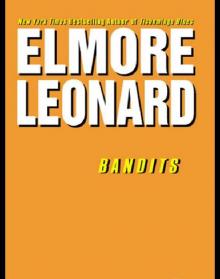 Bandits
Bandits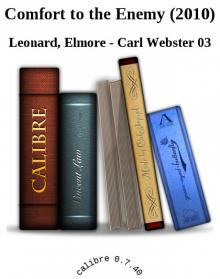 Comfort to the Enemy and Other Carl Webster Stories
Comfort to the Enemy and Other Carl Webster Stories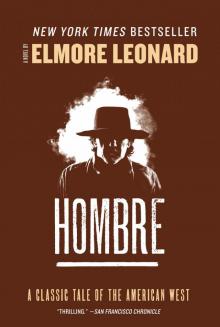 Hombre
Hombre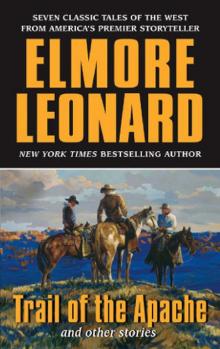 Trail of the Apache and Other Stories
Trail of the Apache and Other Stories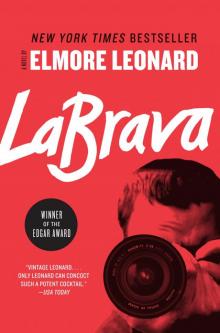 LaBrava
LaBrava Gold Coast
Gold Coast Jackie Brown
Jackie Brown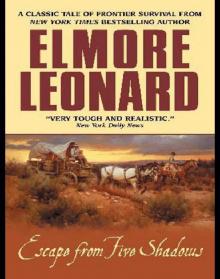 Escape From Five Shadows
Escape From Five Shadows Karen Makes out (1996)
Karen Makes out (1996)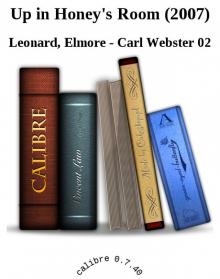 Up in Honey's Room
Up in Honey's Room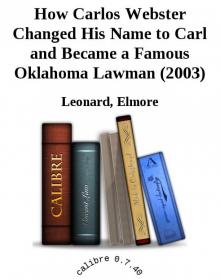 How Carlos Webster Changed His Name to Carl and Became a Famous Oklahoma Lawman (2003)
How Carlos Webster Changed His Name to Carl and Became a Famous Oklahoma Lawman (2003)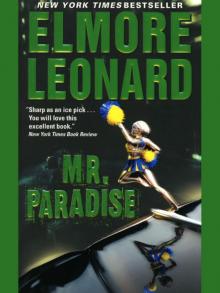 Mr. Paradise
Mr. Paradise The Hunted
The Hunted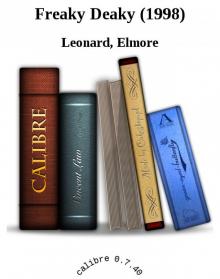 Freaky Deaky
Freaky Deaky Louly and Pretty Boy (Ss)
Louly and Pretty Boy (Ss)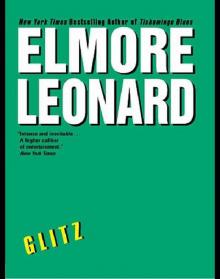 Glitz
Glitz A Coyote's in the House
A Coyote's in the House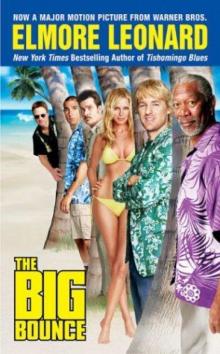 The Big Bounce jr-1
The Big Bounce jr-1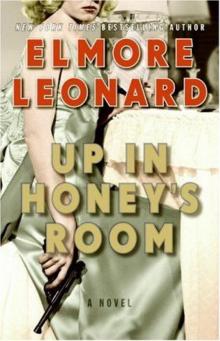 Up in Honey's Room cw-2
Up in Honey's Room cw-2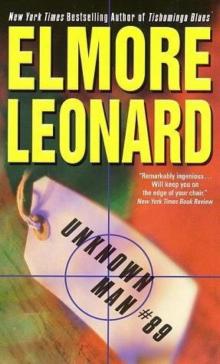 Unknown Man #89 jr-3
Unknown Man #89 jr-3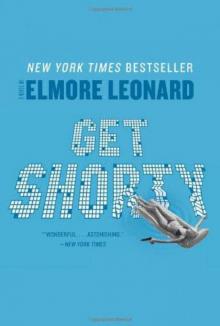 Get Shorty: A Novel cp-1
Get Shorty: A Novel cp-1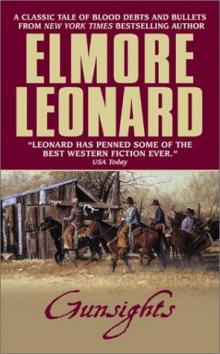 Gunsights
Gunsights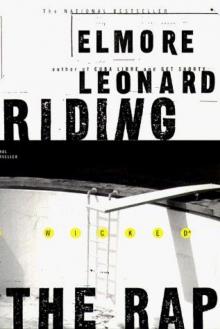 Riding the Rap rg-2
Riding the Rap rg-2